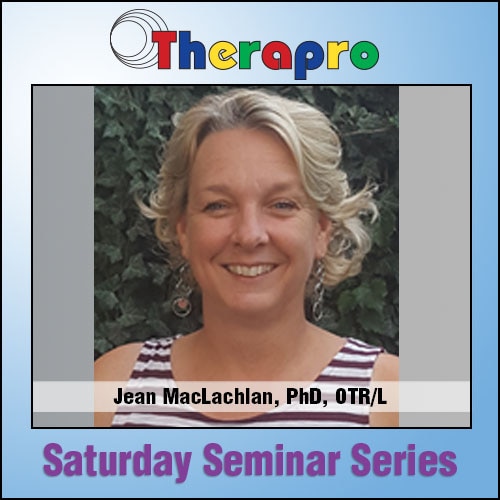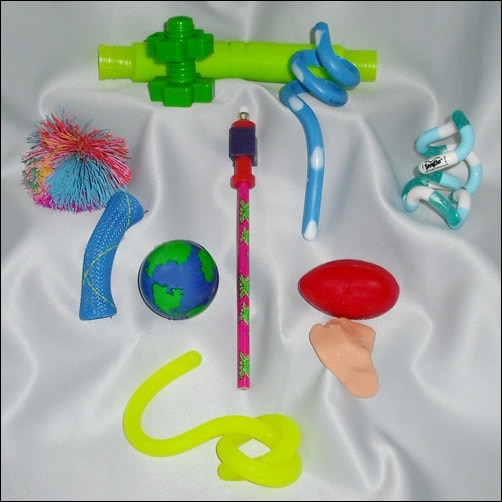 Jean MacLachlan, PhD, OTR/L’s November 4th 2014 Saturday Seminar was entitled: The Impact of Personalized Tool Kits on Adolescents with Mental Illness: How to Assess, Develop and Integrate into Daily Routines. A specialist in mental health and sensory processing, Dr. MacLachlan teaches at Salem State University, conducts research, and consults throughout the US. Her focus has been on the integration of sensory-based interventions into “non-traditional settings.”
Jean MacLachlan, PhD, OTR/L’s November 4th 2014 Saturday Seminar was entitled: The Impact of Personalized Tool Kits on Adolescents with Mental Illness: How to Assess, Develop and Integrate into Daily Routines. A specialist in mental health and sensory processing, Dr. MacLachlan teaches at Salem State University, conducts research, and consults throughout the US. Her focus has been on the integration of sensory-based interventions into “non-traditional settings.”
Jean’s thoughtful and thought-provoking seminar revealed some surprising documentation about adolescent mental health including the statistic that about 20% of children and adolescents in the US have been diagnosed with a mental health disorder that impairs their lives (NIMH, 2010; Perou, 2013). Jean provided a summary of supportive literature that indicates that a sensory-based approach to treatment promotes positive behaviors. Jean’s research using individualized sensory tool kits yielded statistically significant results in 6 areas, 3 of which affected all study participants including an increase in self perception of sense of occupational competence; an increase in daily number of hours in the classroom; and a decrease in the number of PRN medications.
 Jean offered a rich array of ideas for creating individualized sensory tool kits that target all sensory areas, depending on the adolescent’s needs. She added cautions regarding some client-specific personal issues including: allergies to certain materials, olfactory experiences that may elicit negative memories in trauma victims, visual responses that may trigger seizures, and vibratory stimulation for hypersexualized adolescents. She advocated building the use of sensory toolkits into a client’s routine to help improve function, which means devising a way that the client has access to his/her toolkit whenever it is needed, i.e. during transition times that might cause an outburst, like going from school to a job. Some Therapro materials that she recommended included:
Jean offered a rich array of ideas for creating individualized sensory tool kits that target all sensory areas, depending on the adolescent’s needs. She added cautions regarding some client-specific personal issues including: allergies to certain materials, olfactory experiences that may elicit negative memories in trauma victims, visual responses that may trigger seizures, and vibratory stimulation for hypersexualized adolescents. She advocated building the use of sensory toolkits into a client’s routine to help improve function, which means devising a way that the client has access to his/her toolkit whenever it is needed, i.e. during transition times that might cause an outburst, like going from school to a job. Some Therapro materials that she recommended included:
- Tactile: Squeezies, Boinks Fidgets, Wikki Stix, Quiet Fun Fidget, Tangles, Fidget Kit
- Olfactory: Scented Clay in Cups
- Proprioceptive: Weighted Dream Blanket, Cozy Caterpillar Body Sox, Weighted Holders
- Vestibular: Wobble Board, Balance Disc Cushion
- Gustatory: Chubuddy with Lanyard, Chew Pendant
- Visual: Touchabubbles
- Auditory: Hearing Safe Noise Reduction Ear Muffs, Califone Hearing Safe Noise Reduction Earmuffs–HS50, Baroque for Modulation CD
In addition to individualized sensory tools, Jean discussed some interesting examples of sensory-based coping skills groups. One example she gave involved playing “Sensory Hopscotch,” where the client throws a beanbag on a sensory square and then identifies the tool in their sensory tool kit they use in that sensory category and why they use it.
With our understanding of sensory processing, occupational therapists can have an important role in providing sensory-based treatment for young people diagnosed with mental illness. Jean provided us with a dynamic seminar including interactive times for participants to share thoughts and problem-solve about tools that may be useful and accessible in their particular setting. Many offered helpful ideas on how to acquire those tools through creative funding. This seminar fulfilled all expectations for attendees who learned how to create and use personalized sensory tool kits with the adolescent population in individual and group settings.
Take a look at just a few of the positive remarks attendees made about this seminar:
“Excellent material, engaging presentation. Thank you!!” – Katherine C., Occupational Therapist
“Great ideas; really liked the built in discussion time.” – Maura M., Teacher
“Lots of ideas, suggestions. Opportunities to collaborate. And free!!” – Anonymous, Occupational Therapist
“Specific and functional activities! Direct and to the point!” – Susan J., Physical Therapist Assistant
“Well organized, informative, and applicable to my work.” – Anonymous, Occupational Therapist
Thank you, Jean!
Filomena Connor, MS, OTR/L
